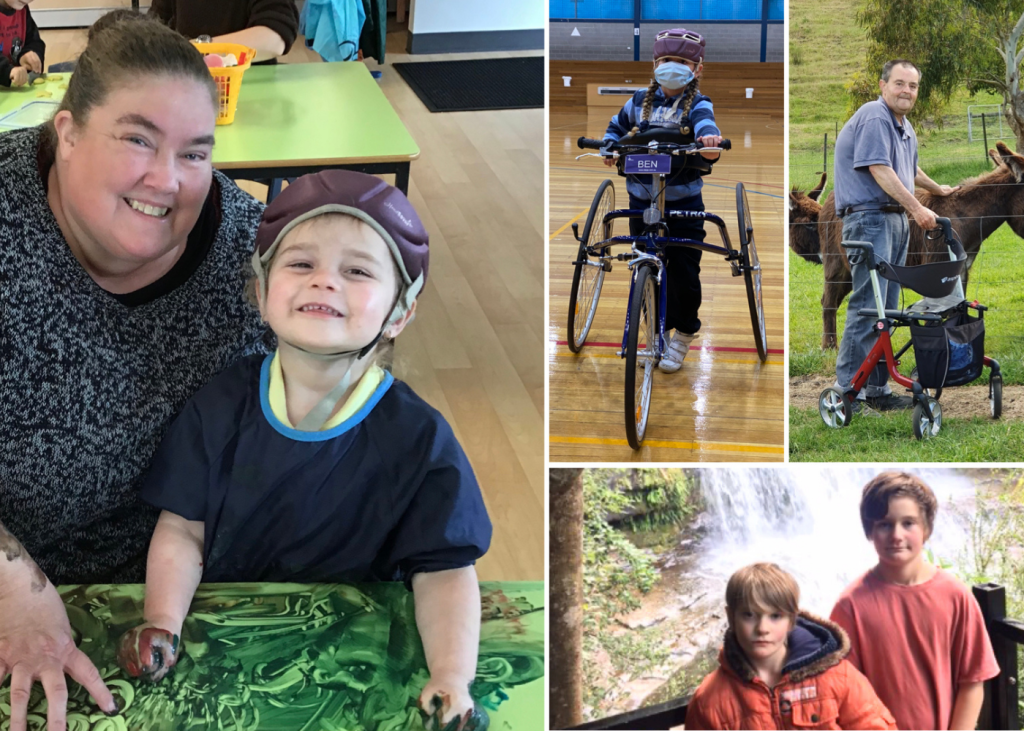Mum of five, Katrina Bartninkaitis knows all too well just how difficult the juggle of sourcing and managing support workers can be.
Equally as complex and challenging, has been finding people who genuinely connect and engage with her three young children – each living with multiple disabilities, as well as her husband John, who has early onset dementia. They all require ongoing, round the clock support.
Katrina needed a solution that enabled her to be in charge of who her support workers are, and when they are rostered on – all without the headache of becoming a mini support worker agency. She had been relying on agencies to find support workers for her, but it wasn’t working out for several reasons.
Often, she would need last minute care, but the agencies would take days – even weeks to approve shifts, and when a support worker finally did arrive, they would not understand the needs of her children, and often sat around on their phones, not engaging with them. This arrangement was unsustainable, and she knew she needed a better solution.
Enter Carer Solutions.
Carer Solutions offer a unique Direct Employ service, assisting families to set themselves up as formal employers and their chosen supports as formal employees. Carer Solutions take care of all the tricky stuff – guiding families like Katrina’s through the process, with all the information and tools they need to set up their own support team.
Katrina has been a Carer Solutions Partner (client) for three years now, and she says it was a “game changer” for her and her family. The Carer Solutions Direct Employ model means parents like Katrina can formalise arrangements with people they already know and trust.
She has two sons with autism and ADHD, Xavier, 10 and Elliot, 12 who both have the same support workers accompany them to their after-school activities. They have a fantastic support worker who participates in the activities with them. “We even bought him a uniform so that he can do Taekwondo with them,” she said.
Katrina says that if it wasn’t for their support worker, her boys wouldn’t participate in the class – they’d just sit on the sidelines. “If the boys have any issues, he (their support worker) is right there with them,” she explains.
Katrina’s six-year-old daughter Lauren, who has cerebral palsy, epilepsy and ADHD, also attends Taekwondo and song and dance classes. Like her brothers, Lauren is getting so much more out of her activities, thanks to the high level of engagement and involvement of her support workers who also join in on her classes.
“That’s the joys of working with Carer Solutions, I have the flexibility to pick and choose the best team for my family.”
“One of my elder son’s friends was looking for work, so we asked him to come on board as the boys’ support worker – and so he did. He is just amazing!” she explains.
Katrina and her family now have a team of 11 support workers who all know the family, and she can call on them as needed.
“All I have to do is send a group text message to my team, asking for a shift to be filled, and within five to ten minutes, it’s done! That’s the great benefit of working with Carer Solutions – I do the rosters, so I am in control of who comes into my home, and when.”
Katrina says her family are now even talking about the possibility of going on a family holiday together.
“That would never have been an option before coming onboard with Carer Solutions, I wouldn’t look back now – I have learnt so much from using their service.”
Find out more about this unique service by visiting the Carer Solutions website or giving their friendly team a call on 1300 729 839.
Please note: In principle the NDIA considers family members as informal support and not employable via the NDIS criteria. People you know beyond family are considered eligible to be employed by you as your support workers. The NDIA states:
“Generally, the NDIA will only fund family members to provide supports in exceptional circumstances. For example, when:
- there is a risk of harm or neglect to the participant;
- there are religious or cultural reasons for funding a family member to provide supports; or
- the participant has strong personal views, for example in relation to their privacy or dignity.”
You can read the NDIA’s full official statement on the NDIS website here




